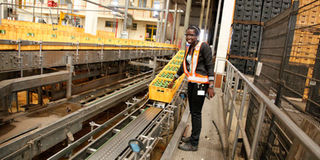Manufacturers want digital tax stamps suspended

Production. A woman inspects beer in a production line. Manufacturers are worried about who will incur the extra costs from digital tax stamp. PHOT0 BY RACHEL MABALA
What you need to know:
- Mr Kasaija adjourned the meeting to December 13 after agreeing that the technical teams from UMA, URA and ministry of finance meet to digest DTS further.
- According to the legal and corporate affairs director, Nile Breweries Limited, Mr Onapito Ekomoloit, the question is, “Who will foot the bill?”
Kampala. Uganda Manufacturers Association (UMA) has asked the government to suspend the enforcement of Digital Tax Stamps (DTS) on the grounds that it will increase the cost of doing business.
According to the manufacturers, they are already grappling with so many challenges, among them the high cost of credit, power and inadequate infrastructure. For that, they are not prepared to incur any additional expenses related to the technology—DTS.
The new stamps are part of Uganda Revenue Authority’s (URA) scheme to combat illicit trade, seal revenue leakages, boost collection and increase efficiency in managing taxpayer compliance. If implemented well, the tax collector says it will enable manufacturers, distributors, retailers and consumers to verify and trace all specified goods throughout the distribution chain.
The manufacturers are, however, concerned about who will pay the bill that comes with the technology.
“We are very disturbed about the DTS,” UMA board chairperson, Ms Barbara Mulwana told the Finance minister in a meeting yesterday at the ministry’s headquarters.
Ms Mulwana continued: “In a way, it is negative and it going to add to the cost of doing business. It going to make it hard for consumers to afford our products and that will affect revenue that the government will collect.”
In the meeting which was adjourned to December 13 when final pronouncement regarding the implementation of DTS will be made by the Finance minister Matia Kasaija, Ms Mulwana argued that implementation of DTS which is expected to take effect early next year (in March) is not feasible even within the next six months.
Should the URA enforce it early next year, she noted that the result will be dire. She recommended suspension of DTS until all parties are clear on all the nitty-gritties and its impact on the manufacturing sector.
According to the legal and corporate affairs director, Nile Breweries Limited, Mr Onapito Ekomoloit, the question is, “Who will foot the bill?”
According to projections, if this technology is forced upon the manufacturers, Nile Breweries alone could lose not less than Shs30 billion ($8 million) in installation of DTS technology in just one single production.
Mr Simon Kaheru, public affairs and communications director at Coca Cola Beverages, said the company he works for will have to reinvest Shs22 billion ($6 million) more to comply with URA requirement, something that does not make business sense to the company shareholders, considering that such funds can attract handsome returns elsewhere.
Adjourned
Mr Kasaija adjourned the meeting to December 13 after agreeing that the technical teams from UMA, URA and ministry of finance meet to digest DTS further. On the very day the suppliers of DTS will be in town to make a presentation about the technology.
However, he said anything that becomes a burden to the manufacturers will not be endorsed by him.
But before that, the head of large tax payers department at URA, Mr Siraji Kanyesigye, said in an interview that the intention of DTS is to enhance transparency.
What are Digital Tax Stamps?
Digital tax stamps are physical paper stamps which are applied to goods or their packaging but in this case contain: security features and codes to prevent counterfeiting, tamperproof features, track and trace capabilities to enable; consumers validate the stamp, traders and manufacturers track the product movement and government to monitor compliance of the product and stamp, Quick response code (QR code) that will allow distributors, retailers and consumers to use an app on their smartphones to verify the authenticity of the products.




